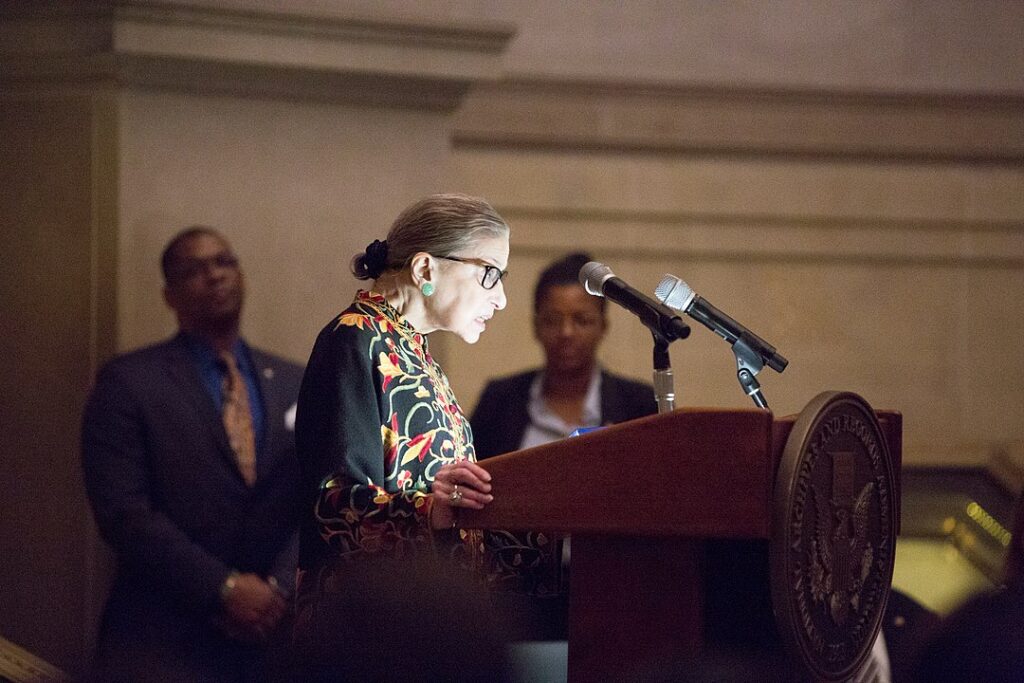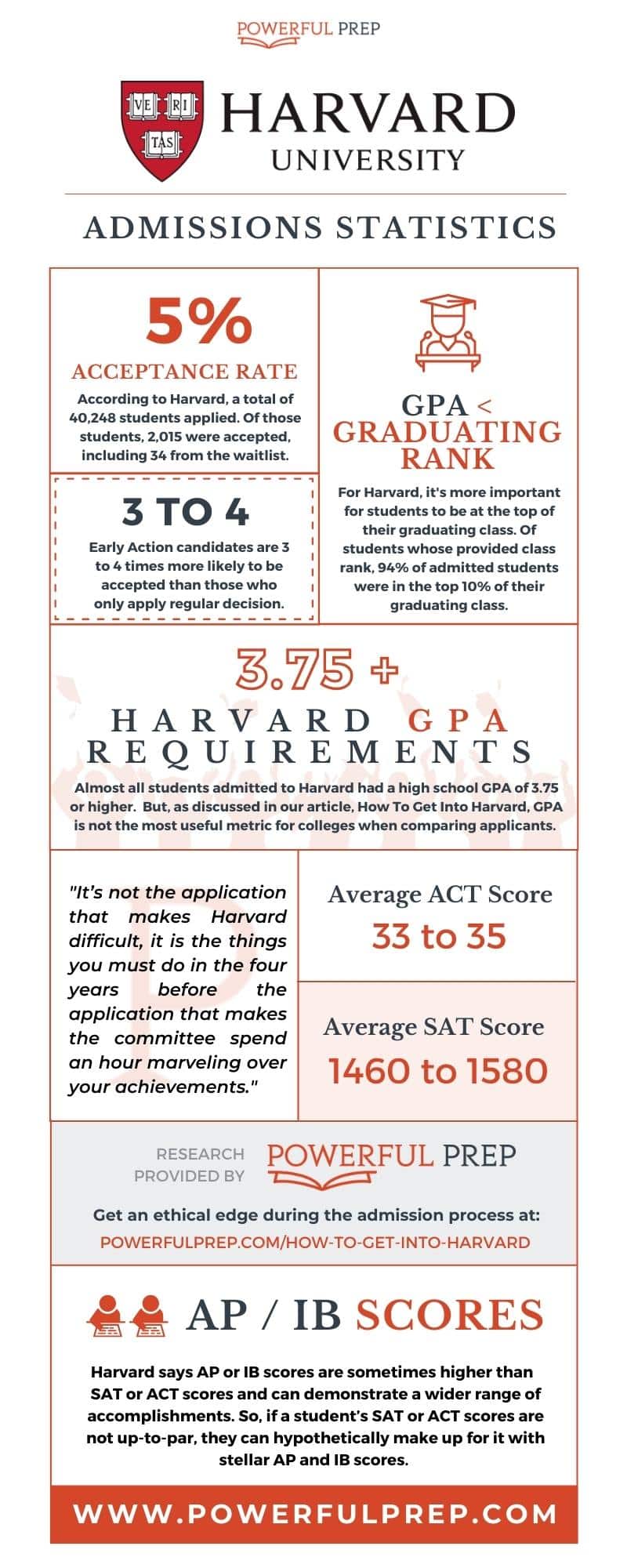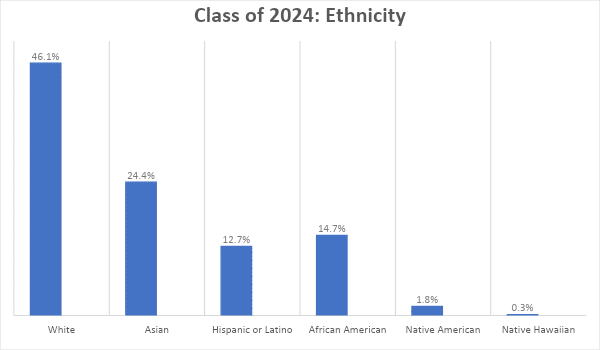How To Get Into Harvard University

How To Get Into Harvard – A Guide To Ivy League Admissions
Home » Blog » How To Get Into Harvard – A Guide To Ivy League Admissions
Want to know how to get into Harvard? As you might have guessed, it's a fairly common question we hear from our students and their parents. Attending a prestigious Ivy League school is undoubtedly a dream for many. And, while it may be more difficult to get into an Ivy League school such as Harvard, the good news is that it's not totally impossible.
In this article, we're going to discuss what it takes to get accepted to Harvard.
Table of Contents
- Table of Contents
- Dean of Admissions Explains The Harvard Admissions Process
- The History of Harvard University
- Harvard University Facilities
- Notable Harvard Alumni
- How do your test scores compare to former presidents'?
- Fun Facts About Harvard University
- What Kind of Student is Harvard Looking For?
- 5 Types of Students Harvard Admissions Prefer
- 1. Those Who Seek Out Advanced Classes To Get Into Harvard
- How To Get Into Harvard ProTip:
- 2. Students Who Know What They Want To Do After Graduation
- 3. Passionate Individuals With Demonstrated Leadership
- 4. Student's Who Don't Buy Into "Club Collector" Mentality
- 5. Students That Contribute To Their Communities
- In a Nutshell, Harvard Looks For Work-Life Balance
- Is Harvard the Right Fit For Me?
- Harvard Not The Right Fit For You?
- Harvard University Acceptance Rates
- Havard Admissions Demographics
- Harvard Class of 2024: Ethnicity Rates
- Areas Where Harvard Students Are From
- Harvard Class of 2024 Geographical Data
- Popular Intended Fields of Study by Harvard Students
- Harvard Class of 2024: Intended Field of Study
- What You Need to Get into Harvard
- What GPA Do You Need To Get Into Harvard?
- What does it mean to be a well-rounded student to Ivy league schools?
- Harvard Application Basics
- Common App
- Harvard's Supplemental Essays
- Harvard Supplemental Essay Prompt #1:
- Harvard Supplemental Essay Prompt #2
- Harvard Supplemental Essay Prompt #3:
- How to Get an Edge When Applying To Harvard
- Apply Early Action (If You Can)
- Under-Represented Intended Major
- Get Recommendations From Someone Who Knows You Well
- Putting It All Together
- Two Pitfalls To Avoid If You Want To Get Into Harvard
- Examples of Successful Harvard Applicants
- The Hardest Part of Getting Into Harvard
Dean of Admissions Explains The Harvard Admissions Process
Let's start by jumping back a few years and hearing how Harvard's Dean of Admissions explain the process.
In 2009, the New York Times interviewed William R. Fitzsimmons, the then dean of admissions and financial aid at Harvard College. Fitzsimons went into detail about the process by which Harvard evaluates the applicants in their pool. He said that once the vast number of applications had been whittled down to a select group, admissions officers would go over each and every application in that pool individually. Some applications were discussed and considered for over an hour.
What would they discuss for an hour? Everything.
Consider their task: the United States has just under 100,000 high schools, and Harvard received about 40,000 applications last year.
That means every other high school had one student who thought he or she was qualified for Harvard.
Out of those 40,000 Harvard applicants, only 1,980 were accepted.
That means for every fifty high schools in the United States, Harvard can only pick one student to attend.
Imagine taking 50 high schools worth of students and trying to find the best student. If only one in fifty students has a 4.0 GPA, that would still leave an entire high school worth of perfect-GPA students, and Harvard will only accept one.
If that sounds extreme, it is.
But here's the good news: someone's got to get in, and we want it to be you.
On that note, let's start digging into some of the specifics. If you want to maximize your chances of getting into Harvard, avoid common mistakes, and find out if Harvard is right for you, read on as we go over Harvard's history, requirements, demographics, and strategies to succeed in the applicant pool.
The History of Harvard University
Established in 1636 by the Great and General Court of the Massachusetts Bay Colony, Harvard is the oldest university in the United States.
Though established in 1636, the college did not own its first piece of true real estate until late 1637 when The Overseers purchased a house and an acre of land from Goodman Peyntree. The property was located on the southern edge of "Cow-yard Row" and soon distinguished as the "College Yard," and later became the nucleus of present-day Harvard Yard. It remains at the southern end of the Old Yard (the area west of Thayer, University, and Weld halls).
In 1638, the school's namesake, John Harvard, became its first benefactor when he willed his personal library of 400 books and half his estate to the college. The school was named after him in recognition later that same year. Today, a statue of John Harvard stands in front of University Hall in Harvard Yard.
Presently, Harvard's total campus area occupies about 500 acres, concentrated in Cambridge and Boston.
Harvard University Facilities
Harvard has nine different facilities which students seeking admission can consider.
Harvard's Faculty of Arts and Sciences includes:
- the Harvard College
- the Graduate School of Arts and Sciences
- the Division of Continuing Education
- and the School of Engineering and Applied Sciences.
The other eight facilities are:
- Business Administration
- Design
- Divinity
- Education
- Government
- Law
- Medicine (including Dental Medicine)
- and Public Health
Additionally, Harvard also has the Radcliffe Institute for Advanced Study.
Notable Harvard Alumni

Harvard boasts a staggeringly impressive list of notable alumni. Any student who gains admission to Harvard can take pride in knowing they will be attending a school that has produced an exceptional roster of artists, politicians, scientists, and prodigies in countless other fields as well.
Former Harvard alumni include:
- W. E. B. Du Bois
- T.S. Eliot
- Hellen Keller
- Ruth Bader Ginsburg
- Neil deGrasse Tyson
- Matt Damon
- Al Gore
- and Mark Zuckerberg
But that's just to name a few...
Harvard has also produced (either as alumni or staff) 28 Nobel laureates, the first of which was Professor Theodore William Richards who won the Nobel Prize in Chemistry in 1914 for determining atomic weights; as well as 8 Presidents of the United States, including John Adams, John Quincy Adams, Rutherford B. Hayes, John F. Kennedy, Franklin Delano Roosevelt, Theodore Roosevelt, George W. Bush, and Barack Obama.
How do your test scores compare to former presidents'?
People have long been curious about the former and current U.S. presidents' IQ, ACT, and SAT scores.
Far be it from us to deny this curiosity, we've compiled the SAT and ACT scores of the most recent leaders.
RELATED READING: Searching For The Presidents' Test Scores
Fun Facts About Harvard University

- The names of eight Harvard alumni, including Adams (pictured), adorn the Declaration of Independence.

2. Continental soldiers were quartered in Old Stoughton College in 1775. The soldiers caused so much damage to the building that it had to be torn down.

3. The oldest continuous chapter of Phi Beta Kappa was formed at Harvard in 1781. Theodore Roosevelt later joined this chapter in 1880.

4. In 1997, Mary Fasano became the oldest person ever to earn a Harvard degree when she graduated from the Extension School at the age of 89.

5. In 1791, a writer in the Boston press accused Harvard of poisoning students' minds with Edward Gibbon's History of the Decline and Fall of the Roman Empire. President Joseph Willard replied that far from even considering Gibbon, the College used a text by French historian Abbé Millot. Nathaniel Ames (pictured), who graduated from Harvard around 1812, recalled Millot's text as "the most utterly worthless and contemptible work of that kind or any other extant."

6. In 1849, Dr. George Parkman (pictured) disappeared at the Medical School in one of the most famous murder cases in Harvard history. Earlier, Parkman had lent money to colleague Dr. John White Webster. To secure the loan, Webster gave Parkman a mortgage on his personal property, including a valuable collection of minerals. When Parkman learned that Webster had backed another loan with the same collection, he began relentlessly pursuing Webster to collect the debt.
A week after his disappearance, a suspicious janitor broke through a brick vault below Webster's lab and found human body parts, which the authorities soon discovered all around the lab. Found guilty of first-degree murder, Webster belatedly confessed and appealed for clemency, but was hanged on Aug. 30, 1850. Parkman's widow led a fund drive to support Webster's wife and children.
What Kind of Student is Harvard Looking For?
Students who are wondering how to get into Harvard need to know this:
Harvard is looking for students with "growth and potential".
To get accepted into Harvard, students must show commitment to excellence through "interests and activities," have upstanding "character and personality," and "contribute to Harvard's community."
But what does that actually mean?
5 Types of Students Harvard Admissions Prefer
When they say they are looking for students with "growth and potential," they want to see that a prospective student is on their way to ever increasing heights. At its most basic level, this means students should not only have near-perfect grades, but that the difficulty of their courses should also steadily increase each year.

Assume that most Harvard applicants will have perfect grades.
How do you differentiate in this environment?
1. Those Who Seek Out Advanced Classes To Get Into Harvard
With the difficulty and quantity of your coursework. All 4.0 GPAs are not created equal---a 4.0 GPA that was achieved with all AP classes is superior to one that isn't.
Students looking for an edge should constantly be looking for ways to grow outside the available high school curriculum.
Supplement your high school curriculum with courses from your local community college in subjects more advanced or unavailable at your high school.
This demonstrates dedication to knowledge and intellectual curiosity.
Harvard is looking for students who will be the future best in their field, so what students choose to focus their growth and potential on should relate to their future aspirations.
How To Get Into Harvard ProTip:
Getting into Harvard means standing out from the competition. Not sure how to do that?
Here are 5 fun ways to get ahead of the pack.
2. Students Who Know What They Want To Do After Graduation
Harvard is most interested in students who already know or have an idea of what they want to do after they graduate college. However, it is not necessary to have a fully fleshed out plan so long as a student can demonstrate that they have given the topic serious consideration and have actively explored options that do interest them.
3. Passionate Individuals With Demonstrated Leadership
Harvard wants students who are passionate about something specific and meaningful to them. This mostly comes in two forms: interests and activities that relate back to a student's future career goals, or interests and activities which demonstrate either a student's unique life experience or a student's "character and personality."
For the former, Harvard prefers students who actively pursue a narrow field of interest to a meaningful degree. Sixty-five percent of students from the class of 2023 reported holding a leadership position in one to three extracurriculars, with the majority of those holding only one to two leadership positions.
However, this isn't a hard and fast rule: so long as a student is passionate about what they do and devotes most of their extracurricular time to those passions.
4. Student's Who Don't Buy Into "Club Collector" Mentality
Similarly, while Harvard is interested in the breath and scope of the activities pursued in the name of a student's goal or passion, it is more important that a student has taken the greatest advantage of all the activities they do have access to.
But don't fall victim to the 'club collector' mentality. Joining clubs is fine, but being in five that have nothing to do with one another or have no link to your extracurricular passions is distracting.
Furthermore, club membership is somewhat assumed. Club leadership is better but is still basically table stakes at Harvard.
Consider doing something more meaningful, more challenging, or unique to demonstrate pursuit of your intellectual passions.
Don't have any?
Unfortunately, you're going to have to fake it.

5. Students That Contribute To Their Communities
Those activities related to a student's unique life experience or their "character and personality" may seem supplemental but are no less important.
Harvard specifically says that "contributions that students make to the well-being of their secondary schools, communities, and families are of great interest to us."
This includes:
- extracurricular activities
- local community
- work experiences
- and help provided to family, such as babysitting, household responsibilities, or working in a restaurant to help with family or personal expenses
These activities "may reflect underlying character and personal qualities," according to Harvard.
However...
Our view is that Harvard doesn't really believe this statement.
Absent extreme extenuating circumstances, a student who talks about babysitting and household responsibilities is not going to be a competitive applicant compared to one who has published a novel.
Harvard is, of course, looking for community involvement, but not of the banal variety.
If you're passionate about your community, show it by leading a protest or helping a mayoral candidate, not by babysitting. The one thing which holds true, regardless of activity, is that they should demonstrate a student's commitment to excellence.
When Harvard says they are looking for students with "character and personality," they are looking for students with intellectual imagination, strength of character, and who can exercise personal initiative and good judgment.
In a Nutshell, Harvard Looks For Work-Life Balance

On the most basic level, Harvard wants students with time management and work-life balance skills.
Harvard is a difficult schooling environment for students who are not self-motivated. They only accept students they believe can handle that rigor. More broadly, Harvard is looking for students who can be teachers to other students, though not in a lecture-type sense.
Harvard alumni often report that the education they received from fellow classmates was as valuable and intellectually stimulating as the one they received from their professors. Harvard wants students who provide fascinating conversation over coffee or lunch and who leave their fellows feeling enriched.
The final thing Harvard describes looking for in prospective students is their ability to "contribute to the Harvard community." Much of what we have already discussed, such as the ability to take on the pressures of college life and being a teacher to fellow students, applies here, but this has more to do with what a student will do on campus rather than who they are.
About 75% of the Harvard class of 2023 reported being involved in community service during High school, but this is not the only way students can demonstrate how they will contribute to the Harvard community. For students seeking admission to Harvard, it is more important to demonstrate that their interests are Harvard-specific.
Is Harvard the Right Fit For Me?
Hopefully, the in-depth discussion of what type of student Harvard wants has illuminated whether Harvard is a good match for your or your student's personality.
In terms of classmates, all Harvard students characterize their fellow students as intelligent, driven, and exceptional. Students usually come from a wealthy background, with well-off outnumbering low-income students 23-to-1.
But this should not be a deterrent to Harvard applicants of any background.
We mention this as an indication of the culture you're likely to experience, as Harvard has a reputation for snobbery that is not entirely undeserved, though general consensus implies that such students can be avoided.

The school has a "sink or swim" mentality, where students who are not independent and self-directed will struggle. The numerous opportunities for research, networking, etc. must be actively pursued, and students who do not do so will not have those opportunities.
However, students who have mental fortitude and drive thrive at Harvard.
Harvard Not The Right Fit For You?
Choosing the right school for you is imporrant. If you're not sure if you'd be a good fit at Harvard, try exploring what other schools have to offer.
For example, here's how to get into UPenn:
Harvard University Acceptance Rates Infographic

Harvard University Acceptance Rates
The Harvard University acceptance rate for the Class of 2024 was 5%. This figure was derived based on the admissions statistics on Harvard's website.
According to Harvard there were a total of 40,248 students that applied. Of those students, 2,015 were accepted into Harvard, including 34 from the wait list.
This year's admissions rate marks a slight increase from the record-low 4.50 percent admitted to the Class of 2023. The College's acceptance rate has steadily declined for the past several years; the bump in this year's rate is the first increase since students applied to the Class of 2018. The number of applicants in this admissions cycle was seven percent lower than last year.
The Harvard Crimson
Havard Admissions Demographics
Most students are white, and about 24% of those white students tend to be legacies (meaning their parents were Harvard alumni). The total number of legacy students admitted to Harvard each year fluctuates slightly but generally hovers around 15%.
One study revealed that 43% of white students admitted into Harvard in the last six years were either:
- legacy students
- recruited athletes
- children of faculty members
- or teens whose relatives had donated large amounts of money to the university

Harvard Class of 2024: Ethnicity Rates
- White: 46.1%
- Asian: 24.4%
- Hispanic or Latino: 12.7%
- African American: 14.7%
- Native American: 1.8%
- Native Hawaiian: 0.3%
Areas Where Harvard Students Are From
Most Harvard students come from the Northeast and West coast, which is also where the largest volume of Harvard applications come from.
Furthermore, 60% of students come from suburban areas, 30% from urban areas, and only 10% come from rural areas. As such, students applying from a less populous state, such as the Great Plains states, may have a slight admissions advantage by virtue of less competition from their area.
Harvard Class of 2024 Geographical Data
- Mid-Atlantic: 22%
- South: 20%
- Midwest: 10%
- New England: 18%
- International: 12%
- Pacific: 14%
- Mountain: 3%
- Central: 2%

Popular Intended Fields of Study by Harvard Students
Most students who are admitted to Harvard have declared some intended field of study, even if they end up pursuing a different concentration. Most students study Biological Sciences or Social Sciences.
This makes sense given that Harvard's graduate Biological and Physical Sciences programs as well as their Political and Social Science programs consistently rank as top 5 in the nation.
So long as they have the quality of activities to demonstrate passionate interest on their application, students who apply while declaring a less common intended major may have an easier time standing out from their peers. This is especially true if they are an underrepresented demographic within that concentration, such as women in computer science (note that there are some caveats here that will be addressed later).
By that same token, students who apply to Harvard as undecided may have a harder time standing out and will need to make sure their application is exceptional in some other way.
Harvard Class of 2024: Intended Field of Study
- Humanities: 14.8%
- Social Sciences: 26.0%
- Biological Sciences: 18.9%
- Physical Sciences: 7.7%
- Engineering: 10.6%
- Computer Sciences: 8.2%
- Math: 7.4%
- Undecided: 6.5%

What You Need to Get into Harvard
On top of stellar grades, Harvard expects is applicants to have:
- 4 years of a foreign language
- 4 years of English (focused on classics and world literature)
- at least 3 years History (one year each of American and European, with one year of some advanced history course)
- 4 years of Math
- and 4 years of Science (one year each of Physics, Chem, and Biology, and one additional year of any of those three at an advanced level)
Harvard also recommends students take coursework which regularly practices "expository prose" (5-paragraph essays or similar).
What GPA Do You Need To Get Into Harvard?
Almost all students admitted to Harvard had a high school GPA of 3.75 or higher. However, as we previously discussed, GPA is not the most useful metric for colleges when comparing applicants.
For Harvard, it seems to be more important that students are in the top percent of their graduating class. Of students whose high school provided class rank, 94% of admitted students were in the top 10% of their graduating class, and no students were in the bottom 50%.
Students' admitted to Harvard had average SAT scores from 1460 to 1580 points; and ACT scores ranging from 33 to 35.
Harvard says that "sometimes AP or IB scores are higher than equivalent SAT or ACT scores and can demonstrate a wider range of your accomplishments," so if a student's SAT or ACT scores are not up-to-par, they can hypothetically make up for it with stellar AP and IB scores.
However, keep in mind that the AP and IB tests are an additional cost to the SAT and ACT. They also cover a wider and deeper range of topics, and achieving an excellent result on an AP or IB test is more difficult than performing well on the SAT or ACT.

Even in the era of COVID-19, admitting a decent SAT or ACT score is in a student's best interest as, even though submitting scores is optional this year, doing so demonstrates a student's commitment to excellence, a quality Harvard emphatically prizes. (You can read more about the change to Harvard's SAT and ACT requirements here.)
Harvard recommends that students submit two SAT Subject Test scores of their choice.
(Update 1/23/2021: The College Board has officially ended the SAT Subject Tests. You can read more about this story here.)
This is technically optional but highly recommended. Especially for international students and students whose first language is not English.
What Subject Tests a student takes should be determined by what their intended field of study is and what they excel in to demonstrate their academic prowess.
What does it mean to be a well-rounded student to Ivy league schools?
First, they aren't looking for individual well-rounded students per se, the Ivy Leagues are looking for well-rounded student bodies. There's a difference!
Harvard Application Basics
Common App
Most students applying to Harvard use the Common App. Students doing so should make sure to fill out all the fields optimally.
For example, Harvard specifically mentions on their "application tips" webpage that descriptions in the "Positions held, honors won, letters earned, or employer" category should be concise, otherwise they may be cut off, implying that this is an error many students make.
Students who want to be accepted should make sure they are not one such casualty.
Similarly, there are various points on the Common App where students will have a limited amount of space to write or list their activities. Harvard calls these places an "act of prioritization". Students should convey the most crucial parts of who they are and what they have done concisely and with specificity.
For example, "raised $30,000 for UNICEF" is a better than "hosted UNICEF fundraiser." This way, students demonstrate that they are Harvard material not just with what they say but with how they say it.
Harvard's three supplemental essays are among the most important ways----besides students' personal statements----to stand out from the application crowd.

The first prompt should be less than 150 words and reads as follows:
Students should elaborate on one of the activities listed in their application but which they have not already discussed elsewhere.
As with most things in the Harvard application, students should prioritize what is most important to them and explain how and why that is. Bonus points for doing so through a brief anecdote.
Harvard Supplemental Essay Prompt #2
The second prompt should also be 150 words and reads:
Your intellectual life may extend beyond the academic requirements of your particular school. Please use the space below to list additional intellectual activities that you have not mentioned or detailed elsewhere in your application. These could include, but are not limited to, supervised or self-directed projects not done as schoolwork, training experiences, online courses not run by your school, or summer academic or research programs not described elsewhere.
This essay is excellent for quickly describing activities and experiences which do not fit neatly anywhere else in the application. Students could discuss building an App at home, shadowing someone in a profession they wish to go into some day or familiarizing themselves with a country's language through an online course before visiting. These types of activities provide a change for students to demonstrate the qualities Harvard is looking for (dedication to excellent, self-motivation, etc.) in a unique way.
The final prompt should be around 500 words long and reads:
You may wish to include an additional essay if you feel that the college application forms do not provide sufficient opportunity to convey important information about yourself or your accomplishments. You may write on a topic of your choice, or you may choose from one of the following topics:
- Unusual circumstances in your life
- Travel, living, or working experiences in your own or other communities
- What you would want your future college roommate to know about you
- An intellectual experience (course, project, book, discussion, paper, poetry, or research topic in engineering, mathematics, science or other modes of inquiry) that has meant the most to you
- How you hope to use your college education
- A list of books you have read during the past twelve months
- The Harvard College Honor code declares that we "hold honesty as the foundation of our community." As you consider entering this community that is committed to honesty, please reflect on a time when you or someone you observed had to make a choice about whether to act with integrity and honesty.
- The mission of Harvard College is to educate our students to be citizens and citizen-leaders for society. What would you do to contribute to the lives of your classmates in advancing this mission?
- Each year a substantial number of students admitted to Harvard defer their admission for one year or take time off during college. If you decided in the future to choose either option, what would you like to do?
- Harvard has long recognized the importance of student body diversity of all kinds. We welcome you to write about distinctive aspects of your background, personal development or the intellectual interests you might bring to your Harvard classmates.
This essay is technically optional, but if students want to be competitive, no essay is truly optional.
For this essay, that is especially true.
Students should think of this as a second personal statement specifically for Harvard.
If possible, students should leave this essay until last to give themselves the plenty of time to brainstorm. According to Harvard, in the past, successful students have used this prompt to "send [Harvard] an essay that they wrote for another school that they thought turned out particularly well; others connect to one of our suggested prompts to add to the common personal statement already prepared."
The specific topic a student chooses for this prompt is less important than using it to demonstrate the Harvard-qualities that students possesses.
How to Get an Edge When Applying To Harvard

Apply Early Action (If You Can)
The single best thing a student can do to improve their admission's chance is applying early action, but only if their application is completely ready by the early action deadline.
Early Action candidates are about three to four times more likely to be accepted than those who only apply regular decision. However, this is because students who apply early had known for years that Harvard was their top choice and have honed their applications to perfection long before the deadline.
FURTHER READING: Most College Admissions Advice is Wrong. Here's What Your Child Should Do Instead.
Under-Represented Intended Major
Perhaps the best intended major to declare is the Humanities. From the section on Application Demographics, students should know that most students apply with Social Sciences or Biological Science as their intended major.
Due to the volume of applicants, students who list these as their intended major will be in competition with everyone else who did the same.
However, students should also avoid going in the exact opposite direction by choosing the least represented majors in the accepted applicant pool: Computer Science and Engineering.
These majors may actually decrease a student's chances at acceptance, and the reason why stems from a single question:
Is Harvard the best place to pursue an education in those majors?
Harvard is known for producing Nobel laureates and political heavy weights. Students genuinely seeking an exceptional degree in Computer Science or Engineering could receive an equal or better education in those fields at MIT or Caltech, and Harvard knows it.
If a student is determined to apply with such majors anyway, he or she should make sure to explain in one of their essays what Harvard has which furthers the student's goals and that other colleges cannot provide.
For example, wanting to go into computer science for election security and developing online voting.
That said, the safer bet for applicants is to choose the popular but underrepresented majors for their application: Humanities and (even) Biological Sciences.
Get Recommendations From Someone Who Knows You Well

Along with a student's personal essays, the recommendations submitted with the application are one of the admissions officers' biggest windows into who a student is.
While guidance councilors are invaluable to their schools and students, most guidance counselors in the United States service upwards of 500 students per year, which limits the amount of time they can spend with each student.
It can be difficult for councilors and teachers to go in depth on a student they do not know well or when they also have 100 other recommendations to write in just a few weeks. This could result in letters of recommendation which come off as rote or play into stereotypes, both of which have a better chance of harming a student's admissions chances than helping them.
Students should look for a councilor/mentor/teacher who knows them well and on a personal level.
Student should also ask their chosen letters of recommendation writers well in advance of any deadlines to give them enough time to craft meaningful and insightful letters of recommendation.
Putting It All Together
The student with the best (statistical) chance of success comes from a rural area, comes from a unique background (such as being a first generation American), and is applying with the Humanities as their intended major.
That student has excellent SAT or ACT scores and a GPA which places him or her in the top 10% of their class. And Finally, the student has exceptional personal essays and teacher recommendations which highlight their passions as well as their energetic but mature personality.
Two Pitfalls To Avoid If You Want To Get Into Harvard
Two ways not to get an edge at Harvard are attempting to transfer or taking a gap year and applying again.
That is not to say that students who maintain a strong academic and extracurricular profile will not have a shot, but the transfer acceptance rate is extremely low and requires extra work.
Taking a gap year is generally riskier than simply accepting a spot at a different school and requesting a gap year there.
Examples of Successful Harvard Applicants
It may be easier for some to get a stronger idea of what all has been done to get into Harvard by seeing it in practice. Provided here are links to examples of students telling their success stories and showing the applications which helped them succeed in getting into Harvard.
However, students reading these applications should remember that this is how other students got into Harvard, it is not an exact guide on what they need to do.
These are references and guidelines, not cold, hard rulebooks for how to get in.
- What One Student's Marked-Up Harvard Application Reveals About the Admissions Process
- 10 Successful Harvard Application Essays | 2019
The Hardest Part of Getting Into Harvard

As with all Ivy League schools, admissions to Harvard requires a demonstration of academic and extracurricular excellence. What makes Harvard different is that the things that would be considered excellent at almost any other school are expected at Harvard.
So how do you distinguish in an applicant pool full of people who achieved perfect grades?
You achieve perfect grades in harder and more courses.
How do you distinguish when everyone founded or is president of three clubs?
You choose a specific focus and do things that others aren't. If you like art, don't join an art club—submit your art to competitions; teach art therapy; write a book on art.
Similarly—how do you distinguish yourself when everyone has a 1500 SAT score?
By scoring a 1550, of course.
It's not the application that makes Harvard difficult, it is the things you must do in the four years before the application that make the committee spend an hour marveling over your achievements.
Are you serious about getting into Harvard?
With the best average point gains in our industry, Powerful Prep students are accepted into the nation's top schools, and often receive merit-based scholarships that more than cover the cost of our services.
Schedule aFREE Consultation
Find out how Powerful Prep can build a customized, one-on-one program to suit your student's needs and goals. Give us a call at 714-312-1393 or complete the form below.
How To Get Into Harvard University
Source: https://www.powerfulprep.com/how-to-get-into-harvard/
Posted by: reynoldsbuthadou.blogspot.com

0 Response to "How To Get Into Harvard University"
Post a Comment